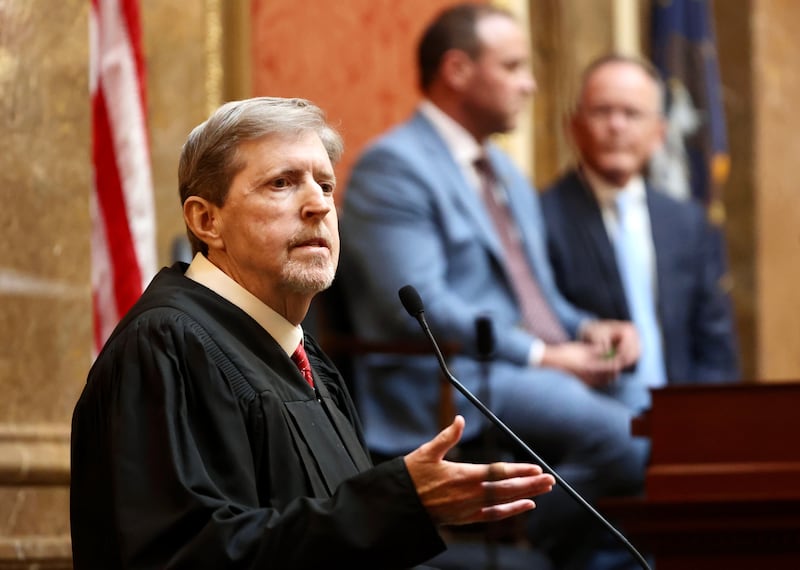The current procedure for appointing a Utah Supreme Court chief justice is by a vote between the five judges who sit on the court. The chief justice will serve for four years and then be replaced or reappointed. Utah’s current Chief Justice, Matthew B. Durrant, has held the title for 13 years.
A judiciary amendments bill argued in the Senate judiciary, law enforcement and criminal justice committee on Tuesday afternoon would structure Utah’s Supreme Court to more closely follow the U.S. Supreme Court’s procedures for electing a chief justice.
The U.S. chief justice is currently nominated by the sitting president and then confirmed by the Senate. SB296 would align Utah’s Supreme Court with the federal model by having the governor nominate and the Senate confirm the chief justice after a four-year term instead of by the justices.

“Involving the executive and legislative branches ensures that the system of checks and balances is utilized as our Founding Fathers intended,” the bill’s sponsor, Senate Majority Whip Chris Wilson, R-Logan, said during the committee meeting. “The process helps preserve the fairness and impartiality of the judiciary, preventing any one branch from gaining undue influence.”
The main difference is that the U.S. chief justice serves for life or until they resign, retire or are removed through impeachment. The Utah chief justice can serve four-year renewable terms.
Wilson argued that the current procedure allows room for “the potential for political maneuvering and insider influence. This legislation aims to eliminate the pressure on justices to play politics with their colleagues, or the public perception that such political maneuvering might influence their impartiality by having the governor appoint the chief justice with Senate confirmation.”
Public opposition
Michael Drexel, assistant state court administrator at the Administrative Office of the Courts, asked the lawmakers to vote no on the bill on Tuesday. Though he is not against Article 8, Section 2 of the Utah Constitution, which states that the laws passed by the legislature guide the election of the chief justice, he would find it “unwise” for the legislature to change how justices are appointed.
“The justices of the Supreme Court know best who can lead them, who can administer and attend to those functions. But even more than that, the chief justice serves a pivotal role within the judicial branch in general,” Drexel said. “They are the presiding officer of the judicial council that administers the judiciary. They deliver the State of the Judiciary speech each year. They are the voice of the judiciary on legislative matters, and as a result, what we end up with is an opportunity, I think, for the political pressure to be exerted on this actor who is so pivotal in the face of the judiciary.”
“Those pressures may end up negatively impacting the ability of the judiciary to function as an independent third branch of government.”
Legislative frustrations
But Sen. Brady Brammer, R-Pleasant Grove, argued that the relationship between the Legislature and Utah’s Supreme Court is “pretty frayed” and “pretty broken” because of the lack of communication.
Though the Utah Bar Association disagrees with many of his bills, Brammer said that there is at least some open communication between the two groups. Last week, the Utah State Bar sent out a press release in open opposition to eight bills — five of which were Brammers — they believe may be unconstitutional.
“I don’t understand why we should treat the Supreme Court differently on our confirmations and why it is such an offense to come back and talk to the legislature and be accountable to some degree as to the performance of the judicial branch.”
Supreme Court decisions last year have prompted legislative action among lawmakers during the 2025 policy-making session. During the State of the Judiciary address ahead of the legislative session, Durrant asked lawmakers for mutual respect among the branches of government.
He also requested increased funding for courthouse workers and more judges.
However, Brammer vocalized his frustrations with Utah’s highest court, calling it “woefully unproductive.”
“In 2023, they were the least productive Supreme Court in America, issuing only 25 opinions. In 2022, they only issued 41; in 2023, they only issued 46; and this year, in the seven weeks so far, they’ve only issued one opinion,” he said, adding that in past years, the court was ruling on over 100 cases annually.
The Legislature, he said, has “some serious concerns as to what they’re doing, especially when they come to us and ask for money for additional court of appeals judges that they could be taking their caseload on. ... So it seems to us that rather than take caseload from the court of appeals, they’ve come to the legislature and said, ‘We want you to fund our lack of productivity.’”
The bill passed the committee 4-2, with Senate Minority Leader Minority Luz Escamilla, D-Salt Lake City, and Sen. Stephanie Pitcher, D-Millcreek, voting against it.

